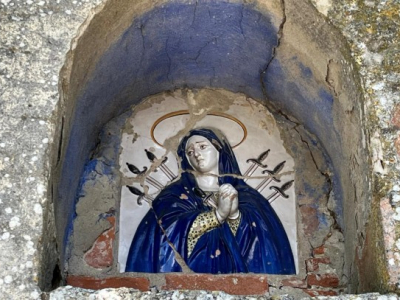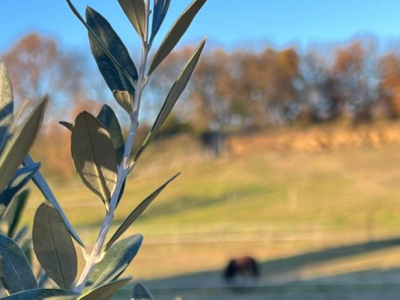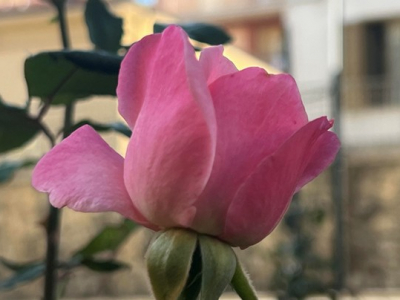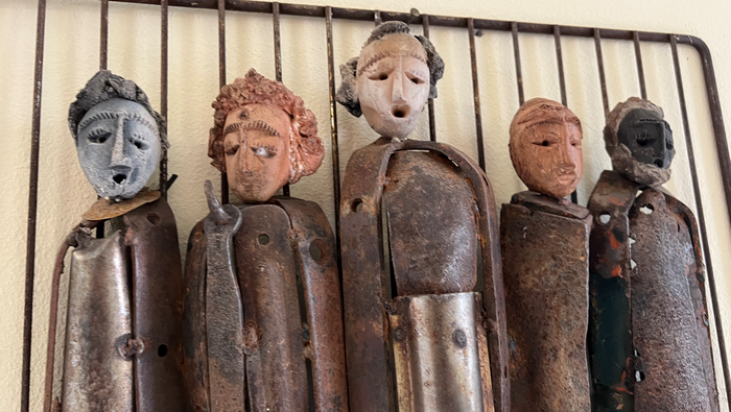stdClass Object
(
[id] => 19943
[title] => The tin can, the flowers and those little Madonnas we no longer recognize
[alias] => the-tin-can-the-flowers-and-those-little-madonnas-we-no-longer-recognize
[introtext] => Narrative Economics/12 - Today the “barbarians” who have entered the “frontiers of civilization” are the armies of consumer capitalism
by Luigino Bruni
published in Avvenire on 29/12/2024
«If the tradition of virtue has been able to survive the horrors of the last dark ages, we are not entirely without hope. This time, however [unlike the time of the collapse of the Roman empire] the barbarians are not waiting beyond the borders; they have already been ruling us for some time. We are not waiting for Godot, but for another St. Benedict.».
Alistair McIntyre, After Virtue, 1981, last page
The most difficult challenge for those who want to try to save the small seed of received faith lies in being able to dialogue with modernity without losing touch with the legacy of popular piety
The most difficult challenge for those who want to try to save the small seed of received faith today lies in succeeding in a unique-double exercise: to dialogue with modernity (with its spirit, its angels, its devils) without losing contact with the legacy of popular piety. In order to do this we should inhabit its contradiction, because the death of popular piety, quickly dismissed as superstition, was the first price the old had to pay to the new. The two spirits, the two winds, clashed, and the younger, rational, masculine one swept away the other fragile, affective, feminine one -- not least because, something of the old had to be eliminated so that in that liberated space true newness could be born. Yet that yearning nostalgia for something deep and beautiful does not let go of us and does not stop calling our rationality by name, as a tenacious voice of subtle silence. Tomorrow's most precious spiritual capital will be born from an ancient and new encounter between different voices.
[fulltext] =>
The 'Ugly Madonna' is one of the most touching stories in Giovannino Guareschi's 'Mondo Piccolo': “People used to call her the ‘Ugly Madonna’: a hair-raising thing because it smacks of collective blasphemy” (Mondo Piccolo. Don Camillo and His Flock, 1953, p. 180). A statue more than two meters tall, of terracotta painted “with such cowardly colors as to make one's eyes ache.” It was not ugly, according to Don Camillo, because it was sculpted by an amateur. No: instead, it had been made by one “who was very good at it,” and who “had employed all his skill as a sculptor to make an ugly Madonna. And he had succeeded” (p. 181). It was “ugly but ancient,” bore the date 1693 engraved on the base, and so no one touched it, “Jesus, why won't you help me? How can you allow people to call the Mother of God 'ugly Madonna'? - Don Camillo,“ replied Christ, ‘true beauty is not that of the face... - Amen,’ replied Don Camillo” (p. 182).
The day of the great procession arrived, and don Camillo thought of solving the problem once and for all. It was August, it was very hot, and don Camillo convinced the bearers that a well-decorated truck would be a better solution to carry Our Lady around: “The road was paved with cobblestones and the truck, which in addition to its beat-up clutch had tires as hard as iron, although it was going slowly seemed to have the dance of St. Vitus.” And so “one jolt louder than the others and the statue crumbled” (pp. 187-188). But here was the big surprise: “The shout that went up from all the people, it was not because the ‘Ugly Madonna’ had fallen apart. It was because of the beautiful Madonna. The people blinked and let out a shout because, as the 'Ugly Madonna' had fallen to pieces, from the butt of the pedestal that had remained tied to the platform of the truck, there emerged glittering, like a silver fruit freed from the rough rind, a marvelous Madonna, smaller than the other, but all silver” (p. 188). Don Camillo was stunned and moved no less than the crowd that cried out for the 'miracle': “I will put you back in place, piece by piece,” Don Camillo said aloud... “I will put you back in place, poor ‘ugly Madonna,’ who saved the silver Madonna from the cupidity of all the barbarians who rained down here from that day in 1600 to yesterday. He who hastily molded you by covering the silver Madonna with your crust, made you ugly and miserable to save you from the hands of the marauders... I, unintentionally caused your miserable end” (p. 189). Involuntarily: “Here Don Camillo told the most brazen lie of his life... He had chosen the longest and stoniest route, he had inflated the truck's tires to bursting point, he had sabotaged the clutch....” Back home, in front of his Crucifix, he concludes his mea culpa with some of the most beautiful and prophetic words in Mondo piccolo: “You, poor ‘Ugly Madonna,’ saved the Silver Madonna from the rapacious nails of the barbarians who infested our lands from those distant times to yesterday. Who will save Our Lady of Silver from the barbarians of today who loom menacingly at the frontiers of civilization and gaze fiercely at the Citadel of Christ? Is this meant to be an omen?” (pp. 189-190).
Guareschi in those years was thinking about the advance of communism and scientific atheism; today, however, we know that the 'barbarians' who have appeared on the 'frontiers of civilization' are the armies of consumer capitalism, which in the more than seventy years that separate us from Mondo Piccolo have shown much more 'rapacious' 'nails'. But we have failed to notice this and have allowed ourselves to be occupied hearts and churches by the idolatry of consumption -- yet one only has to look at what a poor thing Christmas has been reduced to, where the child Jesus, who generates no business, has disappeared from this feast of the new religion. But there is more. Although Guareschi does not tell us, in this 'Ugly Madonna' who had kept in her womb a 'Beautiful Madonna,' we can discern a valuable anthropological message. It is not uncommon that what others see of us is an 'ugly madonna' that hides an invisible 'beautiful madonna,' who in order to reveal herself needs a bumpy stretch of life, her own stronger jolt, the crumbling of a depression or illness; sometimes provoked by a 'Don Camillo' who brings out the masterpiece.
Continuing the reading of Don Camillo and His Flock, we come to the last chapter - 'The Wall' - and there we find Our Lady again. In the kitchen garden of a certain Manasca stood an ancient wall, now in ruins. The master decided to demolish it to make a four-story building out of it, with “stores, a café, a restaurant” (p. 435), and thus give work to many people. Peppone was enthusiastic: “The future of the country is at stake here.” And so, a week later the demolition work began: “The retaining wall was a great rubbish of stones and scrap and mortar... but...” There was a but: “There was something on the embankment wall that everyone knew but no one had thought of before. On the side of the alley, a meter from the edge to the square, was the Madonnina,” a shrine with a rusty iron grating. It had been painted “by a poor man,” but had stood there for two or three hundred years: “Everyone knew her and everyone had greeted her a million times and everyone had slipped a flower inside the canning jar set on the little wooden shelf” (p. 436). One of those shrines that can still be seen in country lanes or in the walls of old houses: we see them, but rarely look at them, almost never recognizethem , because we have forgotten the language with which to speak to them and hear their words; and so we have also forgotten the language of the angels, of the dead, of God.
Bagò, the foreman, stopped: “I won't throw it down even if the Pope orders me to,” he said (p. 437). They go to call Don Camillo, who unexpectedly gives his consent to the demolition. But no one on the team felt like giving the fatal pickaxe: “So Peppone ... raised the pickaxe, saw that the eyes of the Madonnina were looking at him, and threw the pickaxe down. - Old world! - he shouted. But why must the mayor do this? What does the mayor have to do with Madonnas?"(p. 440). Do not destroy the Madonnas of your fathers: it was an eleventh commandment of our people, which we erased along with the other ten. That small world did not have our rights nor our wealth, but the poor did not destroy the niches of the saints; and by guarding them they were not only guarding the past: they were guarding their own and their children's future.
Peppone surrendered, and turned to Don Camillo: “Madonnas and saints are your stuff. I have never called you to pick axe down the bust of Lenin or Stalin! - But if you call me I will come - exclaimed don Camillo.” Then he added, “The eyes of that little Madonna have seen all our dead. Before that image is the despair and hope, the sorrows and joys of two or three hundred years” (p. 441). This from Don Camillo is a wonderful definition of what that popular piety that we first ridiculed and then demolished with our pickaxes really was. Those ancient crosses of true looks were much more than religion - they were love, pain, dreams, hope, the only tenderness in a rough life, which protected our grandmothers from often absurd and distant theologies. We wanted to erase all that and found ourselves inside an infinite void, along with an infinite thirst for those different looks: “‘Peppone, do you remember when in ’18 we came back from the war? The flowers were mine, but the gavetta was yours'. Peppone grunted” (p. 440).
And finally here was an unexpected tremor: “A crack slowly opened. The wall did not fall: it crumbled.” But to everyone's amazement, “at the top, freed from the rusty lattice and the centuries-old shadows of the niche, was the Madonnina, intact.” “It will return to its place in the new wall - said Manasca.” And Peppone “thought of his old little bib with don Camillo's flowers in it” (p. 442).
With these words of Peppone the second volume of 'Mondo Piccolo' closes, and perhaps there are no better words to say goodbye to don Camillo, Peppone and their author who, together with Silone and Carlo Levi, have kept us company during these twelve weeks. A beautiful journey, and for that I thank Avvenire again, in its Director Marco Girardo, for the trust that it continues to give me. Bewitched by 'Mondo Piccolo' , and before that by 'Fontamara' and 'Christ Stopped at Eboli,' I did not realize my initial plan to also comment on Kafka, Buzzati, Calvino and Manzoni, perhaps because even in the craft of writing, reality is superior to the idea, and it is she who decides rhythm and content. Maybe we will do this in a future series. Thank you, to you readers, my now necessary friends. And happy 2025: we need it badly. Goodbye.
[checked_out] => 0
[checked_out_time] => 0000-00-00 00:00:00
[catid] => 1170
[created] => 2024-12-28 23:23:26
[created_by] => 64
[created_by_alias] => Luigino Bruni
[state] => 1
[modified] => 2025-02-04 14:00:18
[modified_by] => 64
[modified_by_name] => Antonella Ferrucci
[publish_up] => 2024-12-28 23:23:26
[publish_down] => 0000-00-00 00:00:00
[images] => {"image_intro":"","float_intro":"","image_intro_alt":"","image_intro_caption":"","image_fulltext":"","float_fulltext":"","image_fulltext_alt":"","image_fulltext_caption":""}
[urls] => {"urla":false,"urlatext":"","targeta":"","urlb":false,"urlbtext":"","targetb":"","urlc":false,"urlctext":"","targetc":""}
[attribs] => {"article_layout":"","show_title":"","link_titles":"","show_tags":"","show_intro":"","info_block_position":"","info_block_show_title":"","show_category":"","link_category":"","show_parent_category":"","link_parent_category":"","show_associations":"","show_author":"","link_author":"","show_create_date":"","show_modify_date":"","show_publish_date":"","show_item_navigation":"","show_icons":"","show_print_icon":"","show_email_icon":"","show_vote":"","show_hits":"","show_noauth":"","urls_position":"","alternative_readmore":"","article_page_title":"","show_publishing_options":"","show_article_options":"","show_urls_images_backend":"","show_urls_images_frontend":"","helix_ultimate_image":"images\/2024\/12\/29\/Madonnina_addolorata_ant.jpg","helix_ultimate_image_alt_txt":"","spfeatured_image":"images\/2024\/12\/29\/Madonnina_addolorata_ant.jpg","helix_ultimate_article_format":"standard","helix_ultimate_audio":"","helix_ultimate_gallery":"","helix_ultimate_video":"","video":""}
[metadata] => {"robots":"","author":"","rights":"","xreference":""}
[metakey] =>
[metadesc] =>
[access] => 1
[hits] => 1164
[xreference] =>
[featured] => 1
[language] => en-GB
[on_img_default] => 0
[readmore] => 9188
[ordering] => 0
[category_title] => IT - Economia narrativa
[category_route] => economia-civile/it-economia-narrativa
[category_access] => 1
[category_alias] => it-economia-narrativa
[published] => 1
[parents_published] => 1
[lft] => 92
[author] => Luigino Bruni
[author_email] => ferrucci.anto@gmail.com
[parent_title] => Economia Civile
[parent_id] => 1024
[parent_route] => economia-civile
[parent_alias] => economia-civile
[rating] => 0
[rating_count] => 0
[alternative_readmore] =>
[layout] =>
[params] => Joomla\Registry\Registry Object
(
[data:protected] => stdClass Object
(
[article_layout] => _:default
[show_title] => 1
[link_titles] => 1
[show_intro] => 1
[info_block_position] => 0
[info_block_show_title] => 1
[show_category] => 1
[link_category] => 1
[show_parent_category] => 1
[link_parent_category] => 1
[show_associations] => 0
[flags] => 1
[show_author] => 0
[link_author] => 0
[show_create_date] => 1
[show_modify_date] => 0
[show_publish_date] => 1
[show_item_navigation] => 1
[show_vote] => 0
[show_readmore] => 0
[show_readmore_title] => 0
[readmore_limit] => 100
[show_tags] => 1
[show_icons] => 1
[show_print_icon] => 1
[show_email_icon] => 1
[show_hits] => 0
[record_hits] => 1
[show_noauth] => 0
[urls_position] => 1
[captcha] =>
[show_publishing_options] => 1
[show_article_options] => 1
[save_history] => 1
[history_limit] => 10
[show_urls_images_frontend] => 0
[show_urls_images_backend] => 1
[targeta] => 0
[targetb] => 0
[targetc] => 0
[float_intro] => left
[float_fulltext] => left
[category_layout] => _:blog
[show_category_heading_title_text] => 0
[show_category_title] => 0
[show_description] => 0
[show_description_image] => 0
[maxLevel] => 0
[show_empty_categories] => 0
[show_no_articles] => 0
[show_subcat_desc] => 0
[show_cat_num_articles] => 0
[show_cat_tags] => 1
[show_base_description] => 1
[maxLevelcat] => -1
[show_empty_categories_cat] => 0
[show_subcat_desc_cat] => 0
[show_cat_num_articles_cat] => 0
[num_leading_articles] => 0
[num_intro_articles] => 14
[num_columns] => 2
[num_links] => 0
[multi_column_order] => 1
[show_subcategory_content] => -1
[show_pagination_limit] => 1
[filter_field] => hide
[show_headings] => 1
[list_show_date] => 0
[date_format] =>
[list_show_hits] => 1
[list_show_author] => 1
[list_show_votes] => 0
[list_show_ratings] => 0
[orderby_pri] => none
[orderby_sec] => rdate
[order_date] => published
[show_pagination] => 2
[show_pagination_results] => 1
[show_featured] => show
[show_feed_link] => 1
[feed_summary] => 0
[feed_show_readmore] => 0
[sef_advanced] => 1
[sef_ids] => 1
[custom_fields_enable] => 1
[show_page_heading] => 0
[layout_type] => blog
[menu_text] => 1
[menu_show] => 1
[secure] => 0
[helixultimatemenulayout] => {"width":600,"menualign":"right","megamenu":0,"showtitle":1,"faicon":"","customclass":"","dropdown":"right","badge":"","badge_position":"","badge_bg_color":"","badge_text_color":"","layout":[]}
[helixultimate_enable_page_title] => 1
[helixultimate_page_title_alt] => Economia narrativa
[helixultimate_page_subtitle] => Economia Civile
[helixultimate_page_title_heading] => h2
[page_title] => Narrative Economics
[page_description] =>
[page_rights] =>
[robots] =>
[access-view] => 1
)
[initialized:protected] => 1
[separator] => .
)
[displayDate] => 2024-12-28 23:23:26
[tags] => Joomla\CMS\Helper\TagsHelper Object
(
[tagsChanged:protected] =>
[replaceTags:protected] =>
[typeAlias] =>
[itemTags] => Array
(
[0] => stdClass Object
(
[tag_id] => 208
[id] => 208
[parent_id] => 1
[lft] => 413
[rgt] => 414
[level] => 1
[path] => economia-narrativa
[title] => Economia narrativa
[alias] => economia-narrativa
[note] =>
[description] =>
[published] => 1
[checked_out] => 0
[checked_out_time] => 2024-10-12 18:02:14
[access] => 1
[params] => {"tag_layout":"","tag_link_class":"label label-info"}
[metadesc] =>
[metakey] =>
[metadata] => {"author":"","robots":""}
[created_user_id] => 64
[created_time] => 2024-10-12 18:02:14
[created_by_alias] =>
[modified_user_id] => 0
[modified_time] => 2024-10-12 18:02:14
[images] => {"image_intro":"","float_intro":"","image_intro_alt":"","image_intro_caption":"","image_fulltext":"","float_fulltext":"","image_fulltext_alt":"","image_fulltext_caption":""}
[urls] => {}
[hits] => 8393
[language] => *
[version] => 1
[publish_up] => 2024-10-12 18:02:14
[publish_down] => 2024-10-12 18:02:14
)
)
)
[slug] => 19943:the-tin-can-the-flowers-and-those-little-madonnas-we-no-longer-recognize
[parent_slug] => 1024:economia-civile
[catslug] => 1170:it-economia-narrativa
[event] => stdClass Object
(
[afterDisplayTitle] =>
[beforeDisplayContent] =>
[afterDisplayContent] =>
)
[text] => Narrative Economics/12 - Today the “barbarians” who have entered the “frontiers of civilization” are the armies of consumer capitalism
by Luigino Bruni
published in Avvenire on 29/12/2024
«If the tradition of virtue has been able to survive the horrors of the last dark ages, we are not entirely without hope. This time, however [unlike the time of the collapse of the Roman empire] the barbarians are not waiting beyond the borders; they have already been ruling us for some time. We are not waiting for Godot, but for another St. Benedict.».
Alistair McIntyre, After Virtue, 1981, last page
The most difficult challenge for those who want to try to save the small seed of received faith lies in being able to dialogue with modernity without losing touch with the legacy of popular piety
The most difficult challenge for those who want to try to save the small seed of received faith today lies in succeeding in a unique-double exercise: to dialogue with modernity (with its spirit, its angels, its devils) without losing contact with the legacy of popular piety. In order to do this we should inhabit its contradiction, because the death of popular piety, quickly dismissed as superstition, was the first price the old had to pay to the new. The two spirits, the two winds, clashed, and the younger, rational, masculine one swept away the other fragile, affective, feminine one -- not least because, something of the old had to be eliminated so that in that liberated space true newness could be born. Yet that yearning nostalgia for something deep and beautiful does not let go of us and does not stop calling our rationality by name, as a tenacious voice of subtle silence. Tomorrow's most precious spiritual capital will be born from an ancient and new encounter between different voices.
[jcfields] => Array
(
)
[type] => intro
[oddeven] => item-odd
)
















